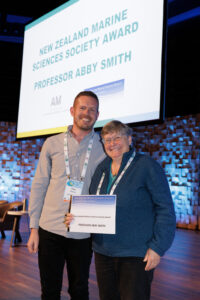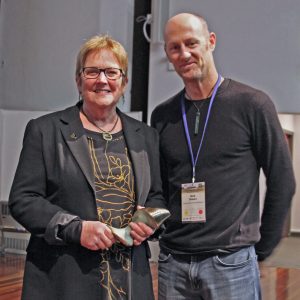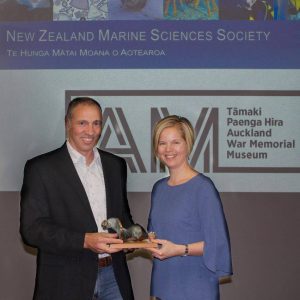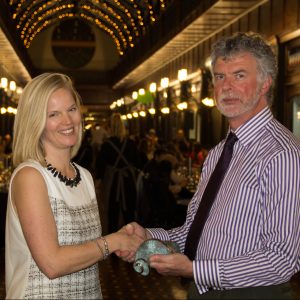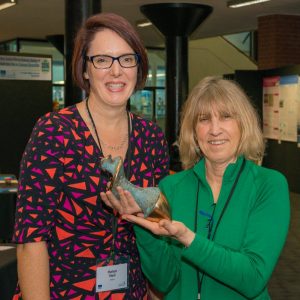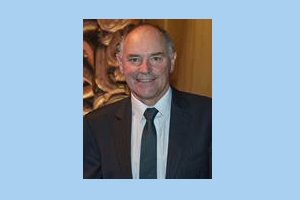2023
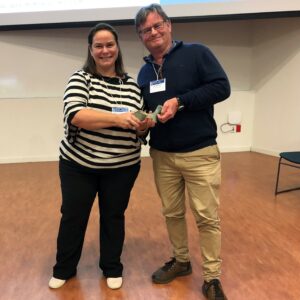
Prof Chris Battershill
Prof Chris Battershill is one of Aotearoa New Zealand’s top marine scientists, of both national and international stature. Chris’ achievements and contributions to marine science span biodiscovery, development of anti-cancer drugs, leading international programmes, oil spill responses, and important work with iwi in issues of development and sustainability of ocean resources.
Chris is internationally recognised for his work on biodiversity and biodiscovery of important medicinal compounds sourced from sponges and seaweeds. One of his career highlights includes the discovery of a rare sponge (Halichondria) off the coast of Kaikōura that led to the creation of the late phase breast cancer drug Halaven®. During his 12 years spent at the Australian Institute of Marine Science he led a large research team in studies on biodiversity and biodiscovery of chemical structures useful in medicine and agriculture.
Chris was a senior marine ecologist at DoC, a programme leader at NIWA and has published 87 research articles and 23 book chapters. He has also achieved national recognition for his work with the Maritime Response Team on responding to the Rena Oil spill where he he gave over 200 media interviews, spoke at marae up and down the Bay of Plenty, coordinated the response monitoring, and prevented the use large-scale use of dispersants which he knew to be disastrous on marine birds.
Chris supervises and mentors many post-graduate students while also lecturing in undergraduate. He is passionate about providing opportunity for all students, from securing funding through to countless hours dedicated to guiding them through the research process. He has supervised over 60 post-graduate students in his career, across biotechnology, sponge taxonomy, biodiversity, monitoring, biotechnology, and Mātauranga-informed restoration of Tauranga Harbour. Chris he has been a very positive influence on hundreds of students, all of whom remember him fondly.
Chris is a longstanding and true supporter of NZMSS and the ideals of communication, support of students, and collegiality.
2022
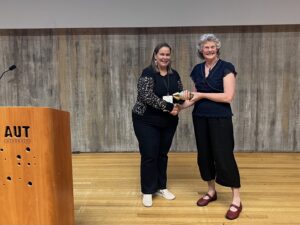
Dr Kim Currie – chemical oceanography and ocean acidification
Dr Kim Currie has had an outstanding career working in the field of chemical oceanography, ocean acidification (OA) and the uptake of anthropogenic carbon. As part of her PhD under Prof. Keith Hunter, Kim started the “Munida Time Series” in 1998 in the waters of offshore Dunedin. This world renowned timeseries, used to understand oceanic uptake of CO2, has now been running for 22 years (144 voyages) under Kim’s leadership and guidance. This is the only long, marine CO2 time series in the Southern Hemisphere and one of only seven in the world. For this work, Kim was part of the Oceans team that was awarded the Prime Minister’s Science Prize (2011). The Munida time series is now part of the New Zealand State of the Environment report, where is it used to report on quantitative evidence of climate change in the oceans.
In 2015, Kim substantially extended this work by establishing the New Zealand OA Network. Through NZOA-ON, Kim has partnered with communities, iwi, aquaculture industry, DOC, and regional councils to extend OA monitoring to 30 sites around New Zealand.
Kim’s ocean carbon lab is highly regarded internationally and has been involved in many inter-laboratory intercalibration exercises through the global quality assurance network. She serves on a Working Group to ensure on-going international supply and access to certified reference materials for marine carbon measurements.
Kim has been at the forefront of OA research, evidenced from her international leadership roles. She is on the executive council of Global Ocean Acidification Network, the advisory board of the Ocean Acidification – International Coordination Centre, and several working groups. She also contributed to development of UN SDG 14.3 methodology and is the co-chair of the Working Group 1 of the UN Ocean Decade Programme – Ocean Acidification Research for Sustainability.
2021
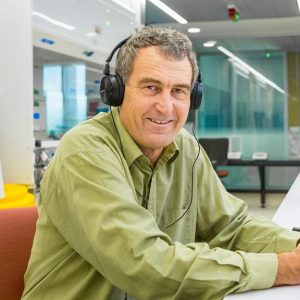
Prof. Andrew Jeffs – aquaculture, lobster biology, and the biological role of underwater sound
In 2021 the NZMSS award was presented to Professor Andrew Jeffs in recognition of the role that he has played in advancing the knowledge and understanding of marine science in New Zealand. While mostly focused on lobsters and bivalves, his published research covers a plethora of other species, including barnacles, crabs, sea cucumbers, reef fish, sea urchins, and octopus. His research also covers a range of habitats, encompassing open oceans, coastal waters, and freshwater, and has been carried out in numerous countries.
Whilst working for the Department of Conservation in the late 1980s he developed a public awareness campaign for marine conservation, especially marine reserves. Whilst working as Principal Scientist, and then General Manager of Aquaculture and Marine Biotechnology at NIWA (1998-2007) he helped to initiate the Bream Bay Aquaculture Park, which remains the largest aquaculture research facility in New Zealand. As Chief Scientist for Darden Inc. (2007-2012), which is one of the largest private buyers of seafood in the world, he pushed seafood sustainability research, including advancing lobster aquaculture towards commercialisation.
Prof. Jeffs has supervised more than 50 post-graduate students, who now contribute to marine teaching, research, environmental management, and commercial and social enterprises in New Zealand and overseas. As a qualified journalist, Prof Jeffs has in the past worked as a science and environment reporter for the New Zealand Herald, where he reported extensively on marine and environmental science. He continues to work closely with the community on marine matters.
Overall, Prof. Jeffs’ contribution to the discipline of marine science has been broad and continuous throughout his career.

